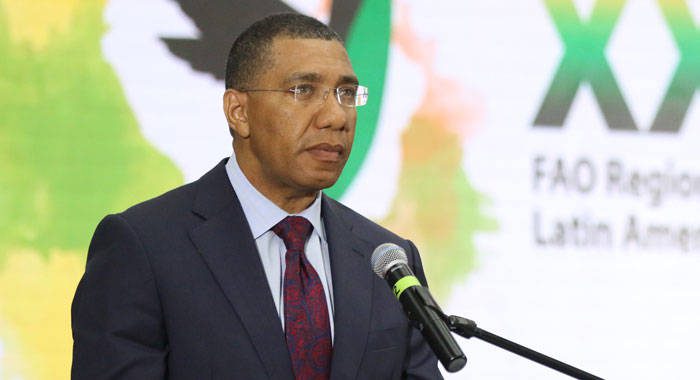By Kenton X. Chance
Montego Bay, Jamaica (iWN) — Food security remains a core component of improving the well-being and quality of life of citizens of Latin America and the Caribbean.
However, for the first time in two decades, hunger is on the rise in Latin America and the Caribbean.
And Jamaica’s Prime Minister Andrew Holness says that the region cannot achieve sustained growth and development with this troubling trend.
“Within this context, as well as [with] the realities of climate change impacting food production and increasing the region’s vulnerability, high energy costs, and increasing food import bills, among others, we are at a critical juncture that requires the time to plan, address the challenges, and identify solutions that will help secure food for generations to come,” he told Wednesday’s official opening of the 35th Session of the FAO Regional Conference for Latin America and the Caribbean.
The four-day conference is focused on the issues of hunger and malnutrition, rural development; climate resilience and sustainable agriculture. Holness identified three areas of action that are critical as Latin America and the Caribbean seek to address these issues.
“The first is that energy security is food security,” he said, adding that it is well known that high energy cost is a barrier to increased growth and competitiveness in many of the sectors – including agriculture.
“We cannot speak of transforming and modernising our agricultural sector without addressing how to alleviate those high energy costs,” he said, adding that his own government is well aware of the closely-bound interaction between energy security and food security and is developing an energy ecosystem that is diverse, environmentally sensitive, and affordable.
“The possibilities for our agricultural sector greatly increase when electricity and other energy-related costs are less vulnerable to volatile oil prices,” Holness told the conference, which, for the first time in many years, included delegates for each of the 33 FAO member nations in the region.
“Farmers, food processing entities, food entrepreneurs, are able to invest in other aspects of their businesses when energy costs are affordable and generally predictable,” he said.
The second critical issue, Holness said, is that the agricultural sector must embrace technology.
He said that there is still heavy reliance on manual processes in agriculture across the region.
“While we cannot deny the close relationship between traditional culture and many of our agricultural practices, we must continue to appreciate the exponential value that can be created when we infuse our agricultural techniques and processes with technology,” adding that this is especially important in the face of climate change.
“Climate smart solutions in agriculture are a must; they will help to adapt production systems, conserve and use energy, land, water, marine resources, forests, and biodiversity much more efficiently. We continue to push the integration of technology in improving irrigation systems, expanding the impact of our agro-park system, and as mentioned, expanding the use of renewable energy,” Holness said.
The third area of critical concern is promoting partnerships to maximise food production.
“As we seek to modernise our food production processes to address hunger and malnutrition; to promote rural development; and to be climate resilient, for greater and lasting impact; the power of partnerships is a necessity,” Holness told the conference.
He said that tourism is a significant industry for many of Latin America and Caribbean economies, adding that the region needs to improve the linkages with this industry and others, including agriculture.
The Jamaican leader said that the region is “at a crossroads in terms of food security; but the final destination has not yet been decided. “
He said that Latin America and the Caribbean have the opportunity and the duty to ensure that the region reverse the trend of rising hunger, and obesity and non-communicable diseases, adding that a key component is lifestyle change.
The region must also promote rural development to stem rural poverty, unemployment, and gender imbalances; and integrate climate smart solutions in our food-related policies and programmes, Holness said.
“… let me reiterate: zero hunger — that is our final destination, and I am confident that we will meet this goal. I know that this conference will generate rich ideas for implementation as we collectively discuss the direction for regional policy,” Holness said.






